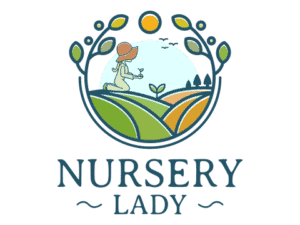Mulching is a common practice in gardens, and so are raised beds. If you are making raised beds for your flowers or vegetables, you might wonder if mulching is a good idea. Let’s find out.
Mulching your raised beds is a good idea if it drains water too fast, you see a lot of weed growth on it, or you want to keep your plants warm. However, you need to be careful not to put too much mulch on your raised bed or use materials that can harm the plants.
This article will dive deep into determining the dos and don’ts of mulching your raised beds, the best materials for mulching, and the mistakes you should avoid. So, keep reading.
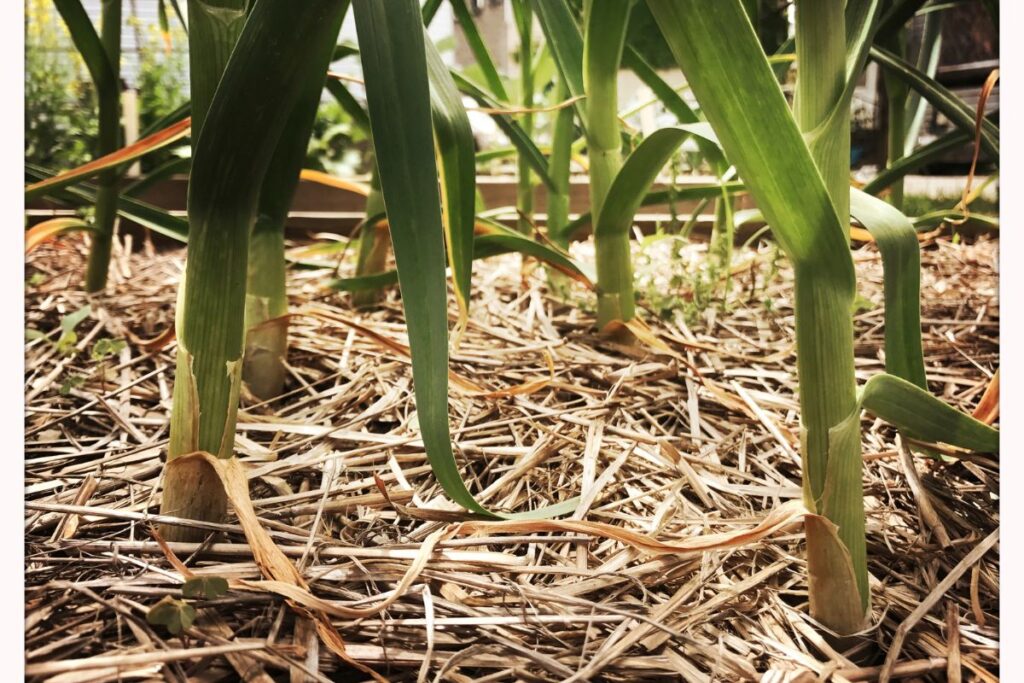
What is mulching?
Mulching is when you prepare a layer of external substances and cover the ground with it.
Mulching is widely practiced in gardens to get better crops, flowers, or plants.
It is also becoming popular in indoor gardens where people mulch their potted plants.
Like any other process, mulching has its pros and cons.
Your plants will get harmed if you don’t know the right way to mulch or use the wrong materials in your raised garden bed.
Can I put mulch in my raised garden bed?
Before you decide to mulch your raised garden bed, you should be aware of the pros and cons of mulching, so you don’t make any mistakes.
It is good to mulch your raised bed to increase moisture retention, keep the soil temperature warm, or stop weed growth.
Pros of mulching raised garden beds
There are a few important benefits of mulching raised garden beds, such as:
- Retain moisture: Usually, the water drains faster in raised beds. So, it is important to ensure that it retains the required moisture for the plants. Mulching helps here by not allowing water to evaporate too fast.
- Stop weed growth: Weeds are a constant problem in gardens. If you don’t want to remove them repeatedly, consider stopping them in the first place. Mulch the raised bed after removing all the weeds, preventing the weed seeds from sprouting.
- Add nutrients: Using organic materials for mulching is a great way of adding nutrients to the raised garden bed. When the mulch decomposes, the organic materials add nutrients to the soil.
- Regulate soil temperature: A layer of mulch allows the temperature underneath the soil to stay even. This is ideal for places that experience extreme cold for the plants.
Cons of mulching raised garden beds
Now that you know all the pros of mulching, let’s understand the cons and how you can avoid them.
- Mold growth: Did you know mulch can give rise to mold? There are some conditions, though. When you use organic materials for mulching, and the external conditions are warm and humid, it can create an ideal environment for mold growth. Too much moisture in the soil can also add to this.
- Unpleasant smell: When the organic materials in the mulch start to decompose, they release an unpleasant smell into the air. It might not be something that everyone enjoys. Some materials like sawdust can also reduce the Nitrogen level of the soil, which can hamper plant growth.
- Too much mulch: When you cover the raised bed with a thick layer of mulch, it puts your plants at risk of death. So, never use too much mulch on your raised garden beds.
- Risk of rot: Too much mulch can retain excess moisture and make the raised bed rot. Also, if you put too much mulch near the plant’s base, the stem can start to rot.
Also read: How Much Soil Do I Need For A Raised Bed? (+Soil Bags Estimates)
Looking for gardening supplies? We have tested 100's of products before recommending them to you guys. Check out our best pick below:
| Image | Gardening Supplies | Best Price? |
|---|---|---|
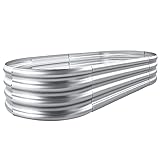 Top
Top Top
Top | Raised Garden Bed Kit | Check On Amazon |
 | XLUX Soil Moisture Meter, Plant Water Monitor, Soil Hygrometer Sensor for Gardening, Farming, Indoor and Outdoor Plants, No Batteries Required | No Results |
 Top
Top Top
Top | 82 Pcs Garden Tools Set and Extra Succulent Tools Set | Check On Amazon |
 | Joeys Garden Expandable Garden Hose with 8 Function Hose Nozzle, Lightweight Anti-Kink Flexible Garden Hoses, Extra Strength Fabric with Double Latex Core, (50 FT, Black) | No Results |
 Top
Top Top
Top | Dual Chamber Compost Tumbler | Check On Amazon |
 Top
Top Top
Top | Sunnyglade Plant Stakes | Check On Amazon |
 Top
Top Top
Top | Organic Cold Pressed Neem Seed Oil | Check On Amazon |
 Top
Top Top
Top | Mighty Mint Gallon :-Insect and Pest Control Peppermint Oil | Check On Amazon |
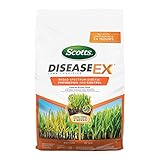 Top
Top Top
Top | Scotts DiseaseEx Lawn Fungicide | Check On Amazon |
 Top
Top Top
Top | Jacks Classic 20-20-20 All Purpose Fertilizer | Check On Amazon |
 Top
Top Top
Top | 30,000 Seeds Pollinator Attracting Wildflower Mixture | Check On Amazon |
 Top
Top Top
Top | Survival Vegetable Seeds Garden Kit-Over 16,000 Seeds | Check On Amazon |
What is the best mulch to use in raised garden beds?
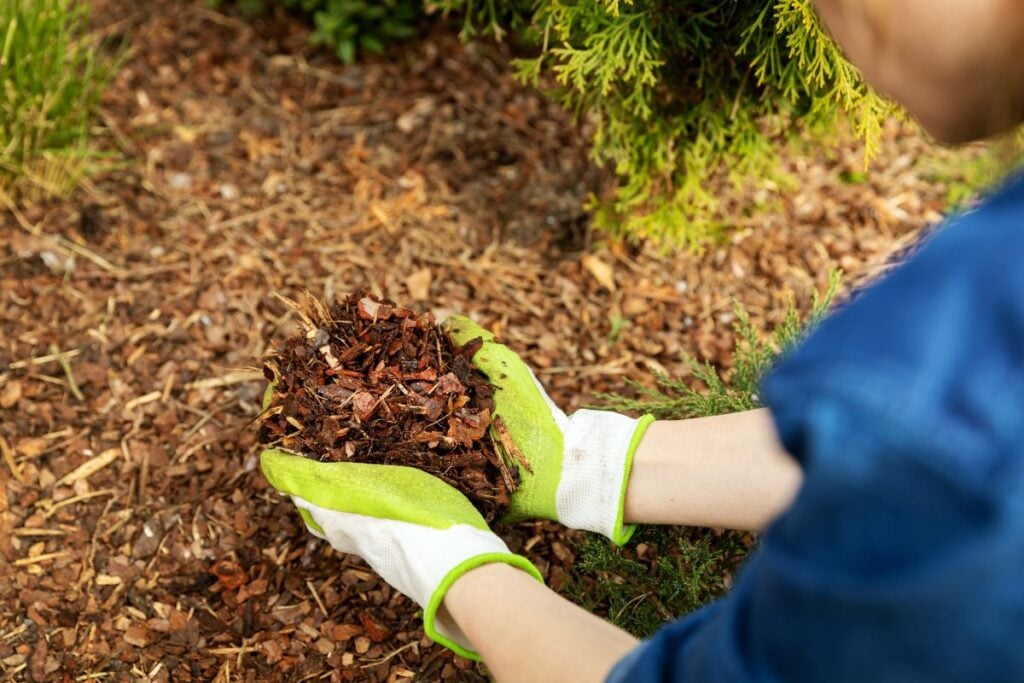
There are two types of mulch: Organic and inorganic.
Before we discuss which would be best for your raised garden beds, let’s understand what falls under organic and inorganic mulch.
1. Organic mulch
Organic mulch is the use of organic materials to mulch the surface. Examples include leaves, barks, etc.
Let’s take a look at the different options available under organic mulch.
Leaves
The easiest mulch material is leaves.
These decompose easily, and if you want them to decompose faster, you can cut them into smaller pieces and then use them as mulch.
The only problem with leaves is that they can create an ideal environment for weed growth after decomposition.
So, you must clean the decomposed leaves and replace them with new ones to prevent weeds.
Compost
Adding compost is a great way of mulching your raised garden beds.
You can mix different organic materials like straw, leaves, grass clippings, etc., to create a layer of compost for mulching your raised garden bed.
Compost can also encourage weed growth, so you must keep an eye out for it.
Cardboard
People use cardboard for mulching their gardens too.
You can get them at retail shops or grocery stores if you don’t have them in the house already.
These decompose quite fast and prevent weed growth.
However, this gets heavy when exposed to rain.
Wood chips
Wood chips are a popular source of mulch that you can use on your raised garden beds.
Wood chips last long, and you won’t need to replace them too often.
But, the problem with wood chips is that it might not be the best if you prefer to replace the mulch on your raised bed yearly.
Grass clippings
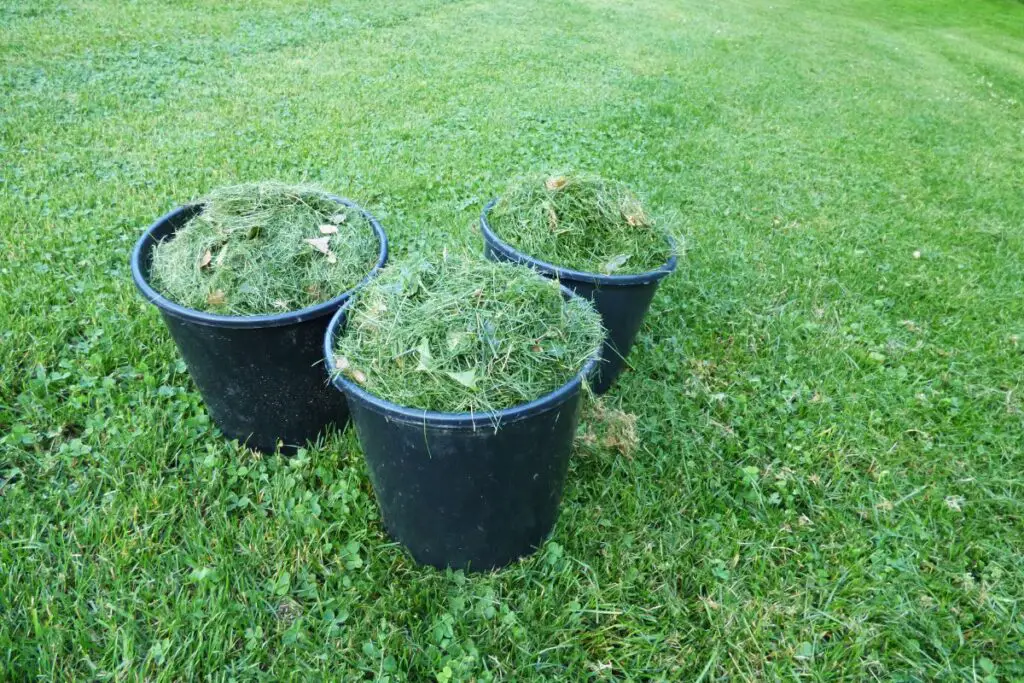
Grass clippings are easily available and decompose fast.
The best thing is they add nutrients to the soil when they decompose.
However, since they decompose fast, you will need to replace them every year.
Then again, be careful not to use grass clippings sprayed with pesticides or herbicides, as these can harm your plants.
Straw
Another popular mulch material is straw.
It is great for stopping weeds, but you must replace them often as they decompose quickly.
The straw will regulate the soil temperature pretty well.
Be careful before using straws as they can contain pesticides.
But otherwise, it is great for mulching your raised garden beds.
Newspaper
Newspaper is easily available, cheap, and widely used for mulching.
Newspaper is used to contain weed growth, but it decomposes very fast.
So, you will have to replace newspapers many times.
Sawdust
Sawdust is fine and is great if you want to regulate the soil temperature.
It is cheap and great for stopping weed growth.
However, be careful while using sawdust, as many plants will not react well to this material.
Always mix sawdust with the soil while composting.
And never use sawdust from chemically treated wood.
Pine Straw
Pine straw is a good source of mulch that decomposes fast.
Pine straws can regulate the soil temperature up to a certain level.
What’s best is that pine straw will add nutrients to the soil as they decompose.
2. Inorganic mulch
Unlike organic mulch, inorganic ones decompose slowly, and you won’t need to replace them repeatedly.
However, this will not add nutrients to the raised garden beds.
Plastic tarp
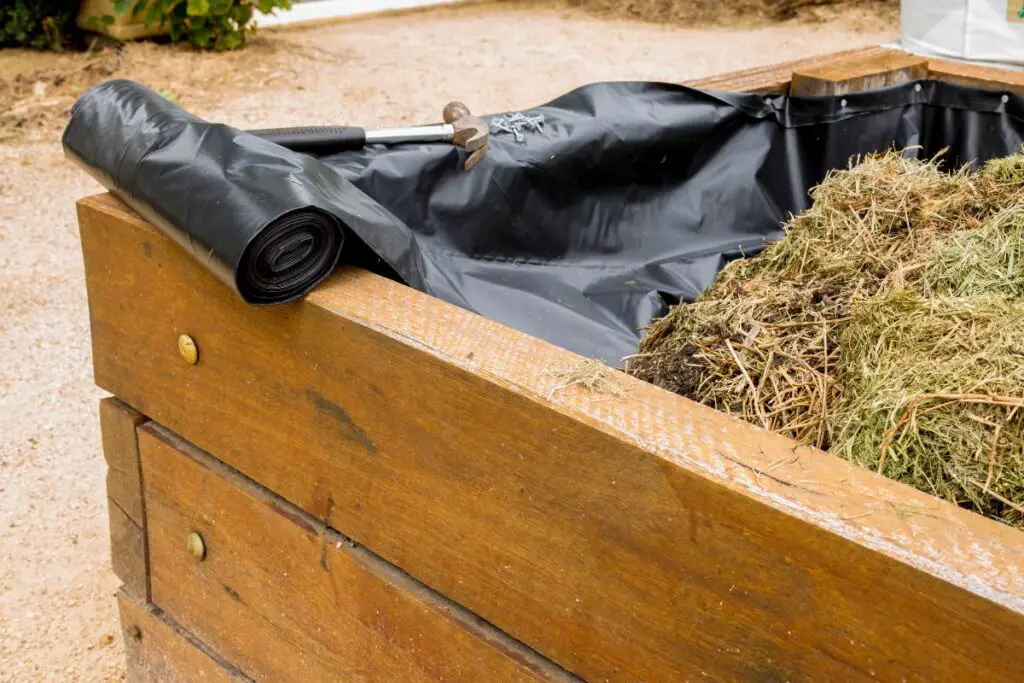
Plastic tarps are good for suppressing weed growth, but you must be careful.
Since plastic is non-permeable, it can suck all the moisture from the soil.
So, you must water the raised garden bed well so it doesn’t go dry.
This material will work well for drought-tolerant plants.
It can also help with soil temperature regulation.
Rubber
You can recycle the rubber from tires and use them for mulch.
It can suppress weed growth but is not ideal for mulching a raised vegetable garden bed.
Gravel
Gravel is made of rocks and is widely used for landscaping as it gives an aesthetic look but is expensive.
It is also heavy and unsuitable for a vegetable or any other raised bed.
Landscape fabric
Landscape fabric is a much better mulch material.
Landscape fabric can suppress weed growth and help with moisture retention and insulation.
You can also use a layer of organic matter over the landscape fabric for mulching.
Now that you know the different organic and inorganic mulch materials, let’s understand what is best for your raised garden bed.
Here are a few factors that will determine the mulching of your raised garden bed:
- Weather conditions: Don’t use organic mulch during the rainy season and when the humidity is high. The organic mulch decomposes fast when exposed to water, leading to mold growth.
- What you are growing: If you are growing vegetables that need protection from low temperatures, like tomatoes, consider mulching with materials that provide insulation. But, for vegetables like spinach, you don’t need to consider this as they don’t need protection from cold.
- The soil: If the soil in your raised garden bed is sandy and drains water fast, a layer of mulch with materials that help retain moisture will be beneficial. But, for clayey soil, you don’t need to mulch with materials that necessarily improve drainage.
Based on these factors, select the mulch material from the list of organic and inorganic ones mentioned above.
Avoid using gravel and rubber for your raised garden beds.
Also read: 17 Materials To Put In Bottom Of Raised Bed? (Cheap & Best Alternatives)
What to avoid while mulching a raised garden bed?
People, especially beginners, make a few common mistakes while mulching their raised garden beds.
Let’s understand them so you can avoid them.
1. Avoid applying too much mulch
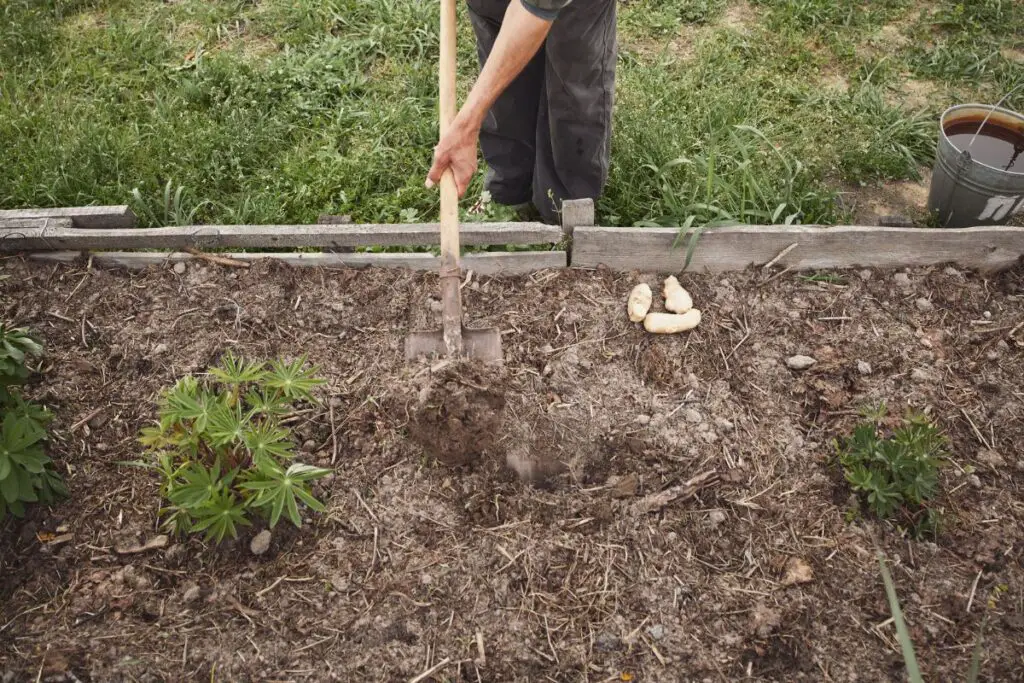
Time to admit that I made this mistake as a beginner and learned it the hard way.
But you don’t have to.
Avoid using heavy layers of mulch as that can cause the raised bed to rot and cause fungal growth.
Decide the depth of the layer based on the material you are using for mulching.
2. Avoid mixing mulch with soil
Mulching is added on top of the soil as a separate layer.
It is best to avoid mixing mulch with the soil as it can deplete the nutrients and hamper the soil structure.
3. Don’t use mulches from unknown sources
Many mulch materials can deplete the soil, especially those with herbicides or pesticides.
And these can kill your plants.
Therefore, avoid getting mulches from unknown sources.
Getting them from unknown sources might also lead to weed growth as the mulch materials might contain weed seeds.
4. Remove the weeds before mulching
It is best to remove all the weeds that you can see before adding mulch.
Although mulching can suppress young weed growth, it may not be able to get rid of mature weeds.
5. Read the label first for commercial mulch
If you get packaged mulches from the market, read the label carefully to ensure that it isn’t dyed.
Natural dye is fine, but an artificial dye is extremely harmful and can kill the beneficial microbes in the soil.
This mulch can also be bad for children and pets.
6. Don’t use woody mulch for vegetable raised beds
Woody mulches might not be the best choice for growing vegetables in your raised garden beds.
Adding woody mulch will make it difficult for you to remove the weeds.
It is best to use compost for mulching vegetable-raised beds.
How to mulch a raised garden bed?
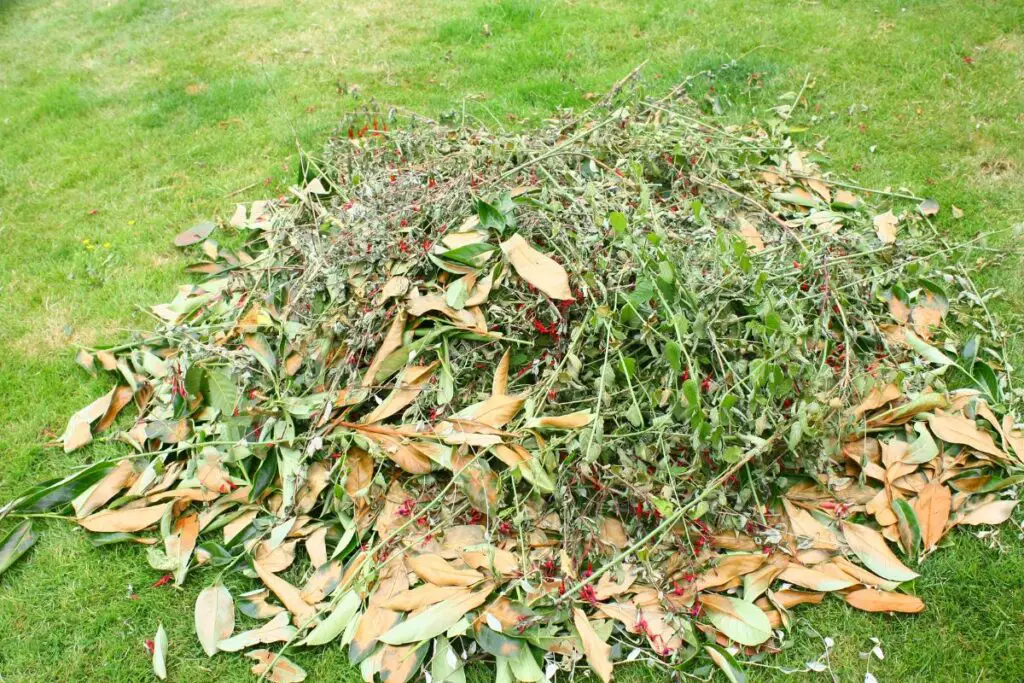
Before you mulch your raised garden bed, you must decide the depth.
If you plan to opt for fine mulch, using fine pieces like sawdust, chopped leaves, etc., you will need a layer of 1-2 inches.
On the other hand, if you use coarse mulch, like wood chunks, you will need to prepare a 3-4 inches layer.
Before you add the mulch, confirm that the raised garden bed has enough depth to hold that mulch.
Here are a few things to remember while mulching your raised garden bed:
- Avoid mulching too close to the plants’ base as it can lead to rot. Keep a 3-4 inches distance between the mulch and the base of the plants.
- If you don’t want to replace the mulches too often, opt for inorganic mulches. And if you are okay with replacing the mulches, go for organic mulch as these decompose fast and release nutrients into the soil.
- Use a thin layer of mulch for clayey soil.
- The best time to mulch is during spring.
Final words
Mulching is prevalent in gardens. If you have a raised garden bed, you can mulch it. Make sure you use the materials that suit your plants and avoid using too much mulch.
It is best to avoid materials like rubber and gravel as these might not be the best for mulching raised garden beds. You can opt for organic mulches like leaves, straw, grass clippings, etc., or inorganic mulches like landscape fabric.
Reference: ScienceDirect, American Society of Agronomy, Noble Research Institute, Soil for Raised Beds, Raised Bed Gardening.
